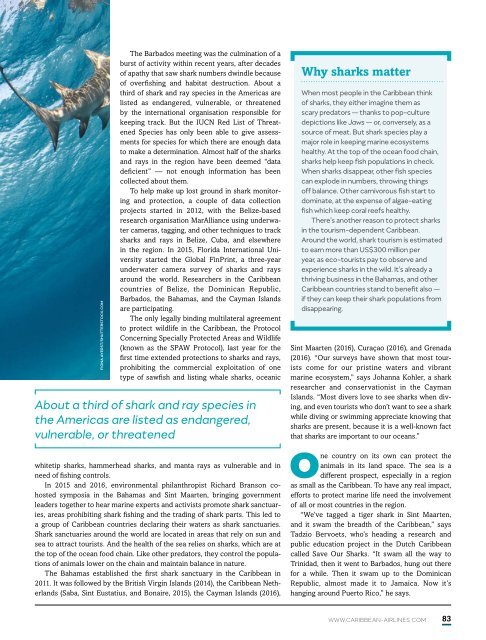Caribbean Beat — September/October 2018 (#153)
A calendar of events; music, film, and book reviews; travel features; people profiles, and much more.
A calendar of events; music, film, and book reviews; travel features; people profiles, and much more.
Create successful ePaper yourself
Turn your PDF publications into a flip-book with our unique Google optimized e-Paper software.
fiona ayerst/shutterstock.com<br />
The Barbados meeting was the culmination of a<br />
burst of activity within recent years, after decades<br />
of apathy that saw shark numbers dwindle because<br />
of overfishing and habitat destruction. About a<br />
third of shark and ray species in the Americas are<br />
listed as endangered, vulnerable, or threatened<br />
by the international organisation responsible for<br />
keeping track. But the IUCN Red List of Threatened<br />
Species has only been able to give assessments<br />
for species for which there are enough data<br />
to make a determination. Almost half of the sharks<br />
and rays in the region have been deemed “data<br />
deficient” <strong>—</strong> not enough information has been<br />
collected about them.<br />
To help make up lost ground in shark monitoring<br />
and protection, a couple of data collection<br />
projects started in 2012, with the Belize-based<br />
research organisation MarAlliance using underwater<br />
cameras, tagging, and other techniques to track<br />
sharks and rays in Belize, Cuba, and elsewhere<br />
in the region. In 2015, Florida International University<br />
started the Global FinPrint, a three-year<br />
underwater camera survey of sharks and rays<br />
around the world. Researchers in the <strong>Caribbean</strong><br />
countries of Belize, the Dominican Republic,<br />
Barbados, the Bahamas, and the Cayman Islands<br />
are participating.<br />
The only legally binding multilateral agreement<br />
to protect wildlife in the <strong>Caribbean</strong>, the Protocol<br />
Concerning Specially Protected Areas and Wildlife<br />
(known as the SPAW Protocol), last year for the<br />
first time extended protections to sharks and rays,<br />
prohibiting the commercial exploitation of one<br />
type of sawfish and listing whale sharks, oceanic<br />
About a third of shark and ray species in<br />
the Americas are listed as endangered,<br />
vulnerable, or threatened<br />
whitetip sharks, hammerhead sharks, and manta rays as vulnerable and in<br />
need of fishing controls.<br />
In 2015 and 2016, environmental philanthropist Richard Branson cohosted<br />
symposia in the Bahamas and Sint Maarten, bringing government<br />
leaders together to hear marine experts and activists promote shark sanctuaries,<br />
areas prohibiting shark fishing and the trading of shark parts. This led to<br />
a group of <strong>Caribbean</strong> countries declaring their waters as shark sanctuaries.<br />
Shark sanctuaries around the world are located in areas that rely on sun and<br />
sea to attract tourists. And the health of the sea relies on sharks, which are at<br />
the top of the ocean food chain. Like other predators, they control the populations<br />
of animals lower on the chain and maintain balance in nature.<br />
The Bahamas established the first shark sanctuary in the <strong>Caribbean</strong> in<br />
2011. It was followed by the British Virgin Islands (2014), the <strong>Caribbean</strong> Netherlands<br />
(Saba, Sint Eustatius, and Bonaire, 2015), the Cayman Islands (2016),<br />
Why sharks matter<br />
When most people in the <strong>Caribbean</strong> think<br />
of sharks, they either imagine them as<br />
scary predators <strong>—</strong> thanks to pop-culture<br />
depictions like Jaws <strong>—</strong> or, conversely, as a<br />
source of meat. But shark species play a<br />
major role in keeping marine ecosystems<br />
healthy. At the top of the ocean food chain,<br />
sharks help keep fish populations in check.<br />
When sharks disappear, other fish species<br />
can explode in numbers, throwing things<br />
off balance. Other carnivorous fish start to<br />
dominate, at the expense of algae-eating<br />
fish which keep coral reefs healthy.<br />
There’s another reason to protect sharks<br />
in the tourism-dependent <strong>Caribbean</strong>.<br />
Around the world, shark tourism is estimated<br />
to earn more than US$300 million per<br />
year, as eco-tourists pay to observe and<br />
experience sharks in the wild. It’s already a<br />
thriving business in the Bahamas, and other<br />
<strong>Caribbean</strong> countries stand to benefit also <strong>—</strong><br />
if they can keep their shark populations from<br />
disappearing.<br />
Sint Maarten (2016), Curaçao (2016), and Grenada<br />
(2016). “Our surveys have shown that most tourists<br />
come for our pristine waters and vibrant<br />
marine ecosystem,” says Johanna Kohler, a shark<br />
researcher and conservationist in the Cayman<br />
Islands. “Most divers love to see sharks when diving,<br />
and even tourists who don’t want to see a shark<br />
while diving or swimming appreciate knowing that<br />
sharks are present, because it is a well-known fact<br />
that sharks are important to our oceans.”<br />
One country on its own can protect the<br />
animals in its land space. The sea is a<br />
different prospect, especially in a region<br />
as small as the <strong>Caribbean</strong>. To have any real impact,<br />
efforts to protect marine life need the involvement<br />
of all or most countries in the region.<br />
“We’ve tagged a tiger shark in Sint Maarten,<br />
and it swam the breadth of the <strong>Caribbean</strong>,” says<br />
Tadzio Bervoets, who’s heading a research and<br />
public education project in the Dutch <strong>Caribbean</strong><br />
called Save Our Sharks. “It swam all the way to<br />
Trinidad, then it went to Barbados, hung out there<br />
for a while. Then it swam up to the Dominican<br />
Republic, almost made it to Jamaica. Now it’s<br />
hanging around Puerto Rico,” he says.<br />
WWW.CARIBBEAN-AIRLINES.COM<br />
83


















